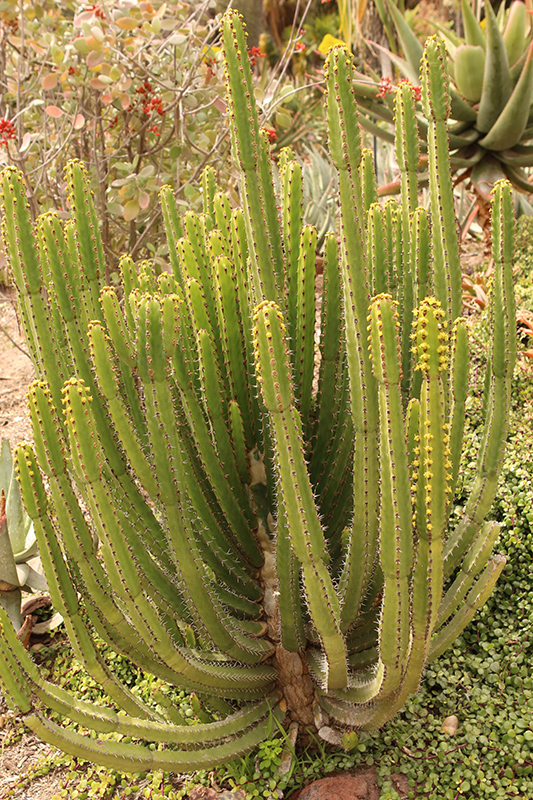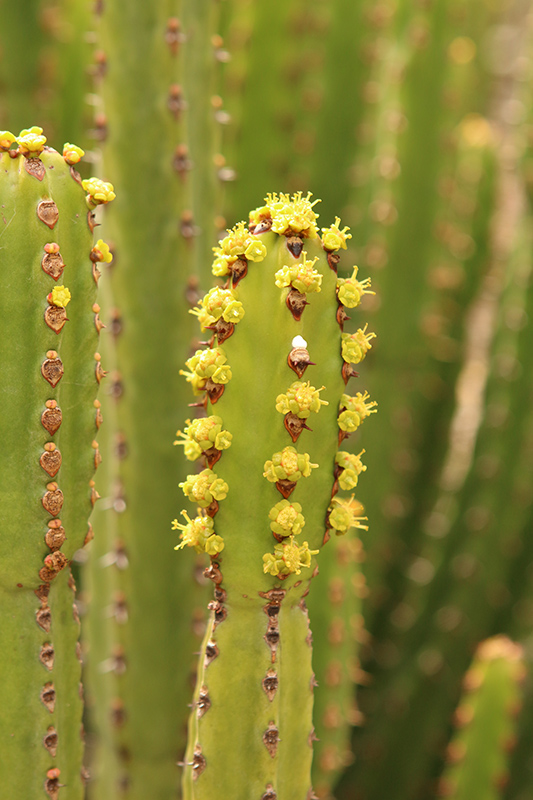Digging deeperPlant Library
Height: 15 feet
Spread: 6 feet
Sunlight:
![]()
![]()
Hardiness Zone: 9
Other Names: Friendship Cactus, Candelabra Cactus
Description:
An attractive, bold plant for a sunny border; narrow green foliage atop cactus-like branches that store moisture; this variety is not known to flower; a great addition to the contemporary garden; all parts of plant are poisonous
Ornamental Features
African Milk Tree is primarily valued in the landscape for its ornamental upright and spreading habit of growth. It has attractive green evergreen foliage. The succulent narrow leaves are highly ornamental and remain green throughout the winter.
Landscape Attributes
African Milk Tree is a dense multi-stemmed evergreen plant with an upright spreading habit of growth. Its relatively coarse texture can be used to stand it apart from other landscape plants with finer foliage.
This is a relatively low maintenance plant, and should not require much pruning, except when necessary, such as to remove dieback. Deer don't particularly care for this plant and will usually leave it alone in favor of tastier treats. Gardeners should be aware of the following characteristic(s) that may warrant special consideration;
- Spiny
African Milk Tree is recommended for the following landscape applications;
- Accent
- Mass Planting
- General Garden Use
- Container Planting
Planting & Growing
African Milk Tree will grow to be about 15 feet tall at maturity, with a spread of 6 feet. It has a low canopy, and is suitable for planting under power lines. It grows at a medium rate, and under ideal conditions can be expected to live for 60 years or more.
This plant does best in full sun to partial shade. It prefers dry to average moisture levels with very well-drained soil, and will often die in standing water. It is considered to be drought-tolerant, and thus makes an ideal choice for xeriscaping or the moisture-conserving landscape. It is not particular as to soil pH, but grows best in sandy soils. It is highly tolerant of urban pollution and will even thrive in inner city environments. This species is not originally from North America, and parts of it are known to be toxic to humans and animals, so care should be exercised in planting it around children and pets. It can be propagated by cuttings.
African Milk Tree is a fine choice for the yard, but it is also a good selection for planting in outdoor pots and containers. Its large size and upright habit of growth lend it for use as a solitary accent, or in a composition surrounded by smaller plants around the base and those that spill over the edges. It is even sizeable enough that it can be grown alone in a suitable container. Note that when grown in a container, it may not perform exactly as indicated on the tag - this is to be expected. Also note that when growing plants in outdoor containers and baskets, they may require more frequent waterings than they would in the yard or garden. Be aware that in our climate, this plant may be too tender to survive the winter if left outdoors in a container. Contact our experts for more information on how to protect it over the winter months.
This plant is not reliably hardy in our region, and certain restrictions may apply; contact the store for more information.
A NetPS Plant Finder tool
This Plant Library is for informational purposes only. We may or may not carry the items listed. During many times of the year, we may carry many more plants in our store than are listed in the Plant Library. Please contact us directly at 303-690-4722 or visit our store for current availability and for assistance.

